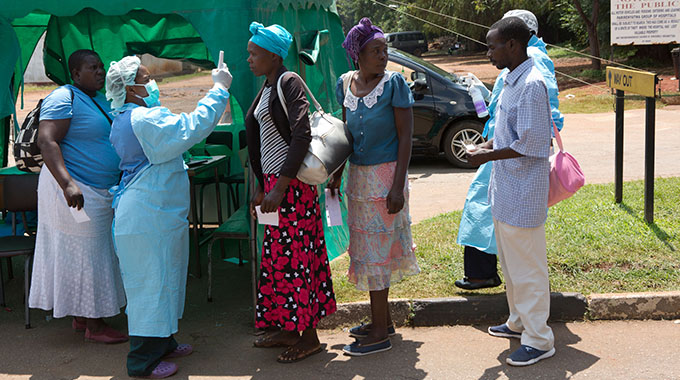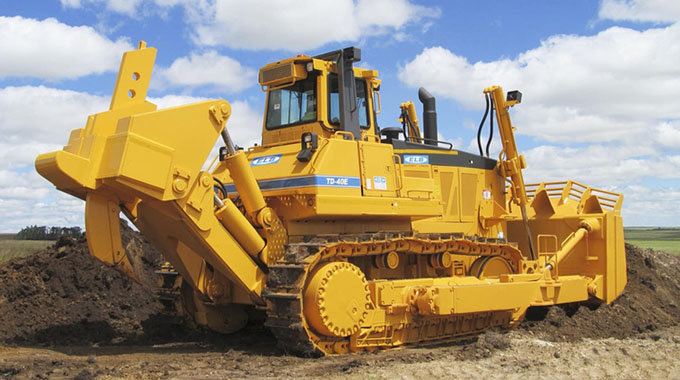Tales of the Harare Covid-19 rapid response team

Paidamoyo Chipunza Senior Writer
Since the first case of Covid-19 was confirmed on March 20, 2020 in Harare, the rapid response team has so far attended to over 5 000 suspected cases, 225 of which have been confirmed to be carrying the virus.
With the current spike in cases and continuous coming of returnees in the country, the team receive and attend physically to an average of 100 suspected cases a day.
Meet the Harare rapid response team (RRT).
The team comprises eight groups of three medical personnel who make physical visits to suspected cases, screen them and ultimately test those strongly suspected to have the virus, thereby putting their own lives and those of their families at risk.
The team identifies suspected cases through alerts, which come from ports of entry, health facilities, community, toll free 2019 and the emergency operation centre.
In an interview with The Herald, the RRT station medic, Mr Eden Zinyemba said upon receiving the alerts, he dispatches teams to make physical visits to where suspected cases would be.
Of late, he said, the number of alerts were growing owing to an increase in the number of returnees coming into the country from Covid-19 hotspots.
“Since operationalisation of the RRT in April, the number of alerts continue to increase on a daily basis, some of which are assessed telephonically,” said Mr Zinyemba.
On average, they attend to about 300 suspected cases, 100 of which require physical visits and testing.
Mr Zinyemba however, bemoaned lack of adequate ambulances to attend to alerts.
Chief fire officer, in charge of ambulances and logistics for the RRT, Mr Lovemore Mafukudze said the department has nine ambulances out of the required 32.
Upon dispatching, Emergency Medical Technician (EMT), Ms Portia Moffat said they ensure that they put on (donning) their protective clothing appropriately, as trained.
“This is important to ensure that there is that protection between a health worker and a suspected patient to reduce chances of transmission of the highly contagious disease since actual testing involves physical contact,” explained Ms Moffat.
She said taking off (doffing) the clothing was also another important aspect of the process to ensure that one does not get infected.
“Response to Covid-19 requires teamwork. We have learnt to practice the donning and doffing processes tirelessly and to be each others’ keeper as we carry out our duties so that we keep reminding each other of the required protective basics and this has helped us a lot,” weighed in another EMT Ms Hazel Gatsi.
Medic leader Mr Tafadzwa Rukwambaire said sometimes the going gets scary, knowing that they are actually getting into contact with positive cases.
He however said spelt out safety rules, have actually kept them going.
Mr Rukwambaire emphasised that safety comes first and if done properly, donning and doffing saves a large number of health workers from being infected.
One of the clinicians, Dr Simba Mazorodze who is a Covid-19 volunteer said sometimes circumstances force them to attend to non-Covid 19 cases as they carry out their duties.
Recalling an incident from which he and a colleague took a suspected pregnant woman from a quarantine facility to a maternity hospital, Dr Mazorodze said they had to assist the mother deliver in an ambulance due to a delay by the facility to take over the patient.
“It was an interesting case for me because I am into mental health but in this case I had to assist a woman deliver. Fortunately for us, delivery was successful and both the mother and baby were subsequently admitted into the facility,” he said.
Dr Mazorodze who is a trainee psychiatrist said the most challenging aspect of his duties is to confirm a Covid-19 status to a suspected case, when someone is asymptomatic.
“Many people have gone into denial, go through all the stages of grief and my role is to assist them to accept reality while observing laid down measures to protect other people around them,” said Dr Mazorodze.
Heard of Emergency Medical Services Dr Soman Mudariki commended his team for their sterling efforts in combating Covid-19 in Harare.
He said since the first case was confirmed, none of his team members have tested positive to Covid-19 despite having attended to about 80 percent of the confirmed cases so far in Harare.
Dr Mudariki said only one incident left them shaken when one of his team members had his mask slip off his face during a procedure with a confirmed positive case.
“We had to immediately act and ask the member to go into self-quarantine,” said Dr Mudariki.
He said because of the exposure associated with their work and duration they sometimes endure in the company of confirmed positive patients, the team is tested for Covid- 19 after every 10-14 days and so far, no one has converted to be a patient.
Dr Mudariki added they have learnt from their experiences that team work is crucial in combating Covid-19.
“Covid-19 is still a new disease, and we continue learning and strengthening our response as each day passes on,” said Dr Mudariki.
According to the latest statistics from the Ministry of Health and Child Care, Harare has so far confirmed 225 cases of Covid-19 and reported two deaths.
About 80 percent of these cases were confirmed by the Harare City Council rapid response team.









Comments